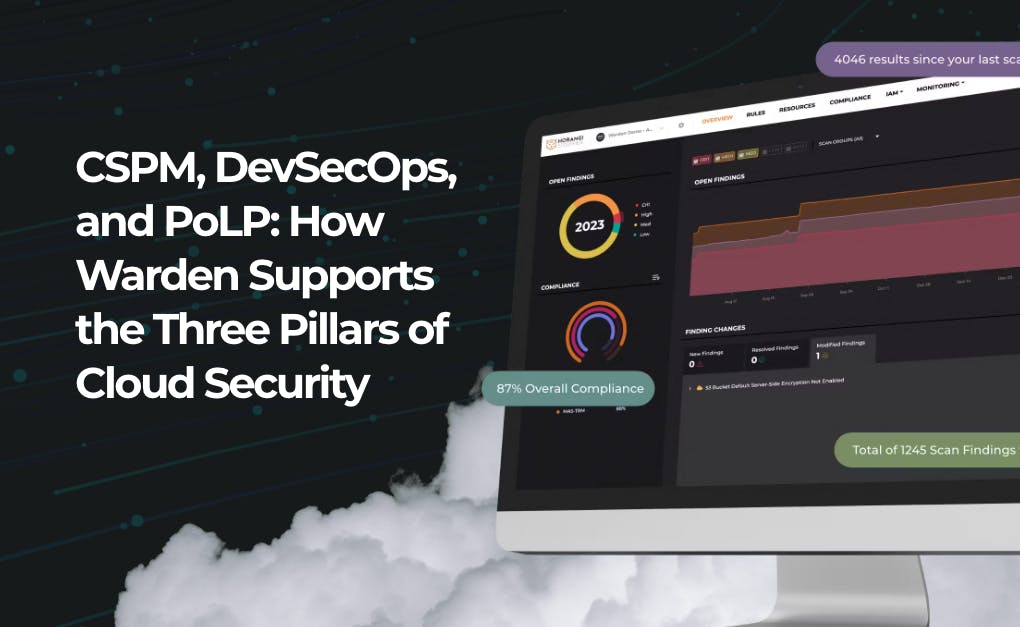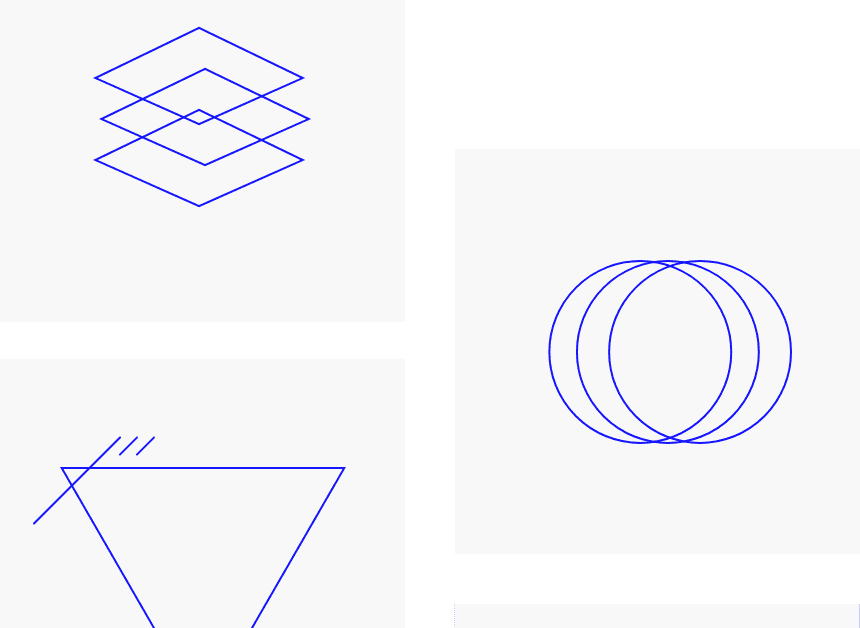The rise of cloud computing has revolutionized the way we work, store data, and access applications, making it one of the most significant technology trends of the past decade. However, as this powerful technology continues to evolve, ensuring robust security measures becomes paramount. This is where Horangi's cutting-edge tool, Warden, plays a crucial role in supporting the three essential pillars of cloud security - CSPM (Cloud Security Posture Management), DevSecOps (Development Security Operations), and PoLP (Principle of Least Privilege) - providing you with a comprehensive and proactive approach to safeguarding your cloud infrastructure, data, and applications.
Cloud Security Posture Management (CSPM)
CSPM is a critical component of cloud security that provides visibility and control over cloud resources. CSPM solutions help organizations ensure that their cloud resources are configured and deployed securely. CSPM solutions typically provide a dashboard that shows an organization's cloud assets, their security posture, and any risks or vulnerabilities. CSPM solutions also provide automated remediation for security issues, ensuring that cloud resources are always secure.
The importance of CSPM in cloud security cannot be overstated. Without CSPM, organizations risk leaving their cloud resources exposed to threats. CSPM solutions help organizations stay ahead of threats by providing continuous monitoring and remediation. CSPM solutions are also essential for compliance, as they help organizations maintain a secure posture that aligns with industry standards and regulations.
With Warden's key features for CSPM, Horangi can assist organizations in the following ways:
- Cloud Asset Visibility: Warden provides a comprehensive view of an organization's cloud assets across multiple cloud service providers. It helps identify and monitor resources, such as virtual machines, storage accounts, databases, and more. This visibility enables organizations to have a centralized understanding of their cloud environment, ensuring that no resources go unnoticed or unsecured.
- Security Posture Assessment: Warden's CSPM capabilities include automated assessments of an organization's cloud resources against best practices, industry standards, and security frameworks. It evaluates configurations, permissions, network settings, and other security controls to identify any misconfigurations or vulnerabilities. By continuously assessing the security posture, Warden helps organizations proactively address security gaps and maintain a strong defense against potential threats.
- Risk Identification and Prioritization: Warden's dashboard presents a clear overview of the security risks and vulnerabilities identified within an organization's cloud environment. It assigns risk levels and prioritizes issues based on severity, enabling organizations to focus their efforts on the most critical areas that require immediate attention. This helps security teams efficiently allocate resources for remediation and mitigation efforts.
- Automated Remediation: Warden goes beyond identifying security issues by providing automated remediation capabilities. It can automatically fix misconfigurations or vulnerabilities based on predefined policies or custom remediation scripts. By automating remediation processes, organizations can quickly address security issues and reduce the window of exposure, ensuring that their cloud resources remain secure at all times.
- Compliance and Reporting: Warden assists organizations in maintaining compliance with industry standards and regulatory requirements. It offers predefined compliance templates and policies that align with frameworks like CIS benchmarks, PCI DSS, HIPAA, and more. Warden generates comprehensive reports that outline the organization's adherence to these standards, making it easier to demonstrate compliance during audits or assessments.
- Continuous Monitoring and Alerting: Warden provides continuous monitoring of an organization's cloud environment, ensuring that any changes or security events are promptly detected. It offers real-time alerts and notifications for critical security events, suspicious activities, or deviations from established security baselines. By enabling proactive incident response, Warden helps organizations minimize the impact of security incidents and quickly mitigate potential threats.
DevSecOps – Development, Security, and Operations
DevSecOps is a software development approach that integrates security into the entire software development process. DevSecOps aims to create a culture of security by making security a shared responsibility of everyone involved in the software development process. DevSecOps emphasizes the need for security to be considered from the very beginning of the development process, and not just at the end.
The importance of DevSecOps in cloud security is evident in the speed and agility it brings to the software development process. By integrating security into the development process, organizations can ensure that security is not an afterthought. DevSecOps also enables organizations to detect and fix security issues early in the development process, reducing the risk of vulnerabilities making their way into production environments. With DevSecOps, security is not just a checkbox item but becomes an integral part of the software development process.
Horangi's Warden offers key features for DevSecOps integration, empowering organizations to seamlessly incorporate security into their software development lifecycle. It provides complete visibility to Security and DevSecOps teams and within just a few minutes of setup, organizations can leverage Warden's supported workflow integrations to receive alerts through their preferred communication channels.
Warden offers third-party integrations to popular platforms like Slack, Github, Bitbucket, Jira, and any SIEM (Security Information and Event Management) system. This flexibility allows organizations to customize how they receive alerts for new Warden findings, aligning with their preferred workflows. For instance, organizations can export their security findings directly to Bitbucket, streamlining the process of addressing security vulnerabilities.
By leveraging Warden's quick and easy workflow integrations, organizations can ensure that their teams receive timely notifications about security issues and collaborate efficiently to address them. This seamless integration enhances the effectiveness of Security and DevSecOps teams, enabling them to work efficiently and effectively during the build time of their projects.
Principle of Least Privilege (PoLP)
PoLP is a security principle that states that a user or process should only have access to the resources necessary to perform their job function. In other words, users and processes should only have the minimum level of access required to do their job. PoLP helps organizations limit the attack surface and reduce the risk of data breaches and cyberattacks.
PoLP plays a significant part in your overall cloud security strategy. PoLP is essential for controlling access to cloud resources, ensuring that only authorized users have access to sensitive data. PoLP is also essential for compliance, as it helps organizations demonstrate that they are following industry best practices for access control. PoLP is a fundamental security principle that should be applied across all aspects of cloud security.
Horangi's Warden offers powerful features, such as Identity & Access Management (IAM) and User Entity & Behaviour Analytics (UEBA), which align with and enforce the Principle of Least Privilege (PoLP). By leveraging these features, Horangi can assist organizations in mitigating the impact of cyber breaches and adhering to PoLP principles in the following ways:
- Identity & Access Management (IAM): Warden's IAM capabilities enable organizations to effectively manage user identities, roles, and access privileges within their cloud environment. It provides centralized control over user authentication, authorization, and access policies, allowing organizations to enforce the principle of least privilege. With IAM, organizations can ensure that users have access only to the resources necessary to perform their specific job functions, reducing the risk of unauthorized access and limiting the potential impact of a cyber breach.
- User Entity & Behaviour Analytics (UEBA): Warden's UEBA capabilities monitor and analyze user behavior within the cloud environment. It establishes baseline user behavior patterns and detects anomalous activities that may indicate potential security threats, such as privilege abuse or unauthorized access attempts. By leveraging UEBA, organizations can proactively identify and respond to suspicious user behavior, enabling them to enforce PoLP by promptly revoking privileges or initiating necessary remediation actions to mitigate the impact of a cyber breach.
How CSPM, DevSecOps, and PoLP work together
While CSPM, DevSecOps, and PoLP are each important components of cloud security, they are most effective when used together. CSPM provides visibility and control over cloud resources, allowing organizations to identify security issues and vulnerabilities. DevSecOps ensures that security is integrated into the development process, reducing the risk of vulnerabilities making their way into production environments. PoLP limits the attack surface and reduces the risk of data breaches and cyberattacks.
When used together, CSPM, DevSecOps, and PoLP form a solid cybersecurity foundation for cloud environments.




